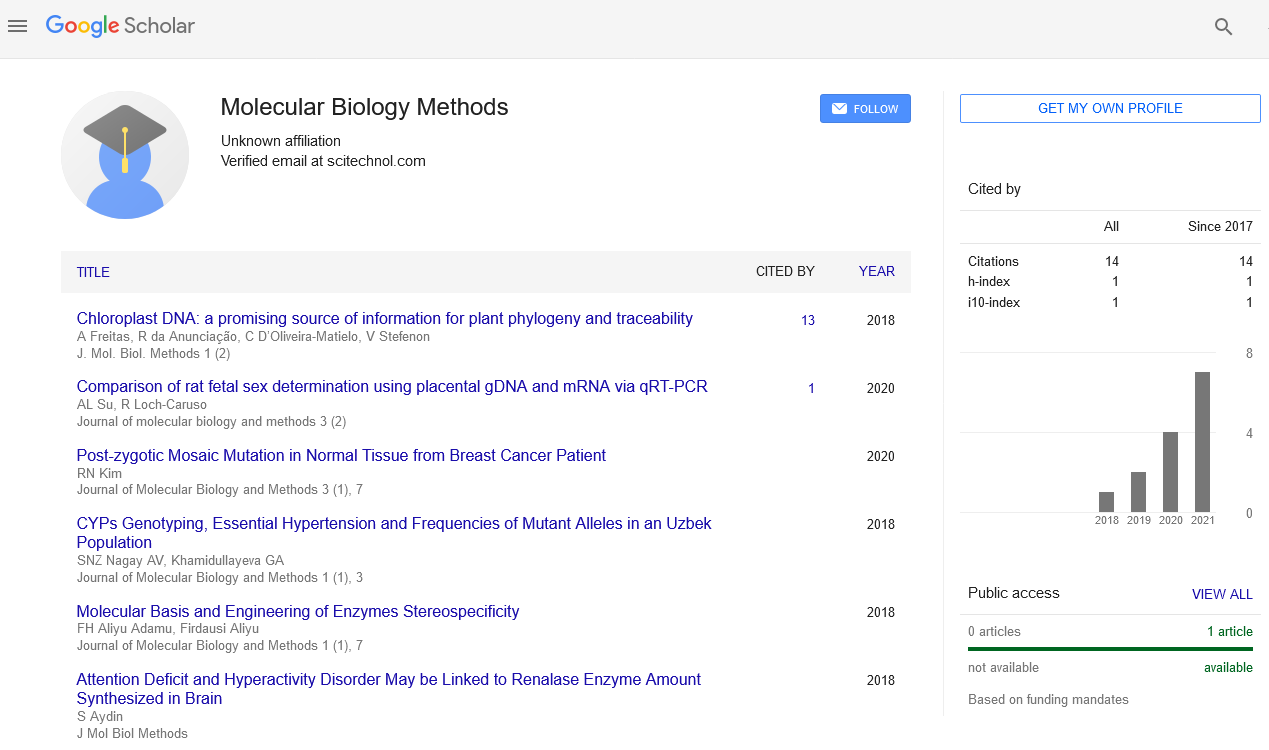Commentary, J Mol Biol Methods Vol: 7 Issue: 2
Evolutionary Developmental Biology: Insights into Developmental Diversity Across Species
Zhang Zou*
1Department of Biology, Fuzhou University, Fuzhou, China
*Corresponding Author: Zhang Zou,
Department of Biology, Fuzhou University,
Fuzhou, China
E-mail: zouzhang@edu.cn
Received date: 28 May, 2024, Manuscript No. JMBM-24-140272;
Editor assigned date: 31 May, 2024, PreQC No. JMBM-24-140272 (PQ);
Reviewed date: 14 June, 2024, QC No. JMBM-24-140272;
Revised date: 21 June, 2024, Manuscript No. JMBM-24-140272 (R);
Published date: 28 June, 2024, DOI: 10.4172/JMBM.1000159
Citation: Zou Z (2024) Evolutionary Developmental Biology: Insights into Developmental Diversity Across Species. J Mol Biol Methods 7:2.
Description
Developmental biology is a field that delves into the intricate processes through which organisms grow and develop from a single cell into complex multicellular structures. It explores the fundamental mechanisms that govern embryonic development, tissue differentiation, and the formation of organs and organisms. This fascinating discipline not only provides insights into the origins of life but also holds significant implications for medicine, genetics, and evolutionary biology.
Embryonic development begins with fertilization, the fusion of a sperm cell with an egg cell, forming a zygote. This single-celled zygote undergoes rapid divisions, leading to the formation of a blastula a hollow ball of cells. The next critical stage is gastrulation, where cells migrate and reorganize to form the three primary germ layers: Ectoderm, mesoderm, and endoderm. These layers give rise to different tissues and organs in the developing embryo.
Pattern formation refers to the establishment of spatial organization in tissues and organs. It involves complex interactions between signaling molecules, gene expression patterns, and cellular movements. Morphogenesis, on the other hand, encompasses the shaping of tissues and organs into their functional forms. These processes are tightly regulated and involve mechanisms such as cell signaling, cell adhesion, and changes in cell shape and size.
The genetic basis of development is a cornerstone of developmental biology. Genes encode instructions for the production of proteins that regulate cell behavior and tissue formation. Developmental genes can control processes like cell proliferation, differentiation, and programmed cell death (apoptosis). Mutations in these genes can lead to developmental disorders and abnormalities, underscoring their critical roles in embryonic development.
Stem cells play pivotal roles in development by giving rise to specialized cell types and tissues. Embryonic stem cells have the potential to differentiate into any cell type in the body, making them valuable for regenerative medicine and tissue engineering. Adult stem cells are involved in tissue maintenance and repair throughout an organism's life. Understanding stem cell biology is essential for harnessing their therapeutic potential.
Evo-Devo explores how changes in developmental processes contribute to evolutionary change. By comparing developmental mechanisms across different species, researchers can uncover the genetic and molecular basis of evolutionary adaptations. This field has shed light on the evolutionary origins of morphological diversity and the conservation of developmental pathways across organisms. Disruptions in normal developmental processes can lead to developmental disorders and birth defects. These conditions can arise from genetic mutations, environmental factors, or a combination of both. Examples include neural tube defects, congenital heart defects, and cleft lip and palate. Studying these disorders enhances our understanding of normal development and informs strategies for prevention and treatment.
Recent technological advancements have revolutionized developmental biology research. Techniques such as CRISPR-Cas9 gene editing enable precise manipulation of gene expression and function in model organisms. Live imaging techniques allow researchers to observe developmental processes in real time. Singlecell RNA sequencing provides insights into gene expression patterns at a cellular level. These tools are expanding our understanding of developmental biology in unprecedented ways.
The study of developmental biology raises important ethical considerations, particularly concerning the use of embryonic stem cells and gene editing technologies. Ethical guidelines aim to balance scientific progress with moral and societal concerns. Future research directions include elucidating more complex developmental processes, such as brain development and aging, and applying developmental biology principles to address global health challenges.
Developmental biology is a vibrant and multifaceted field that continues to unravel the mysteries of life's origins and complexities. From the cellular processes of embryonic development to the evolutionary underpinnings of morphological diversity, this discipline integrates genetics, molecular biology, and physiology to provide profound insights into the natural world. As technology advances and our knowledge deepen, developmental biology promises to remain at the forefront of scientific discovery, impacting fields as diverse as medicine, agriculture, and conservation biology.
 Spanish
Spanish  Chinese
Chinese  Russian
Russian  German
German  French
French  Japanese
Japanese  Portuguese
Portuguese  Hindi
Hindi 